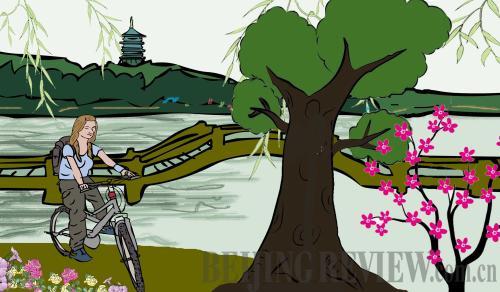|
 |
|
(LI SHIGONG) |
In April last year, some friends and I were busy making travel plans to take ourselves from "winter" Beijing to spring Hangzhou, east China's Zhejiang Province.
We booked a cozy little hotel by the edge of town where we were surrounded by tea plantations left and right. Once we dropped off our bags and peeled off our layers, we took a walk around the inner West Lake. We soon learned from our neighbors that we came at the best moment any Longjing tea lover could plan for. This was the time that the tea picked would be the most flavorful and fresh—at the cusp of Spring, conveniently marked by the Tomb-Sweeping Festival, which falls on in the early April.
Our first lunch was in a courtyard restaurant there, which could only be described as "chill." We were surrounded by about three groups that ranged from grandparents with babies to old-timers playing mahjong. We sipped our amazingly fresh and bargain-priced tea, made faces at the toddlers and bought overpriced (but still cheaper than Beijing) strawberries from a vendor that we ate to our heart's content. It was perfect.
Before coming to Hangzhou, we had read about the ubiquitous rental bike system around the city and once we figured out how to use the rental card system, hopped on one and sped off. We weaved through the city and the only time we felt agitated by the transportation there was when we weren't on bikes and stuck in a taxi during a traffic jam.
To be fair, that traffic jam was largely due to the fact that our last day in Hangzhou landed on the actual Tomb-Sweeping Festival. That meant no work, no school and a rush to get out and visit tombs of late ancestors. After the morning traffic jam, our party decided to opt out of the mad holiday rush and spend the rest of the day at an art gallery and then a tea house by West Lake.
Everyone could be going 100 miles per hour in the rush of the holiday, but by the lakeside teahouse, we were protected from it all.
Hangzhou during spring could not be more beautiful or more romantic a city. Walking or biking around the lake by sunset, or sipping tea while nibbling on an array of snacks, the city had the vibe of a brilliantly lazy beauty. Brilliant at best, lazy at worst, but always beautiful throughout. What more could one expect from a city that Marco Polo once described as "the most beautiful and most magnificent in the world?"
I understood then the old Chinese adage of "shang you tian tang, xia you su hang" or "up above there is heaven, down below there is Su and Hang," referring to Suzhou and Hangzhou.
As the haze continues in Beijing and with winter lasting much longer than it should, memories of Hangzhou drift in temptingly. The warmer weather, the cleaner air and the smell of freshly picked and dried tea leaves steeping in your cup—who could resist?
The author is a Canadian living in Beijing
Email us at: zanjifang@bjreview.com | 